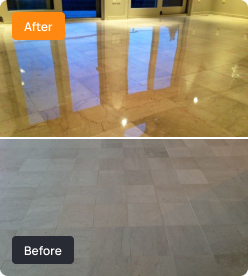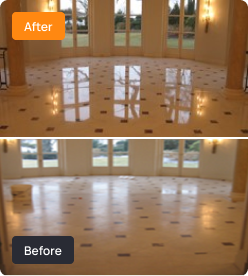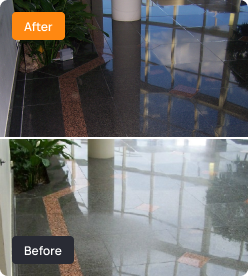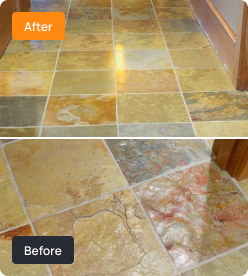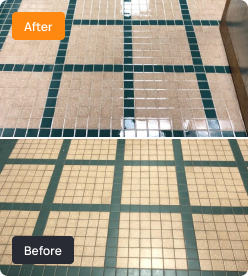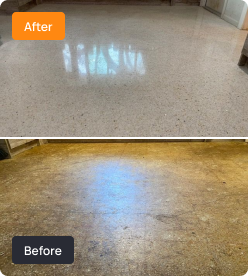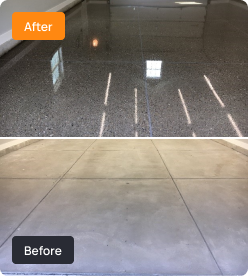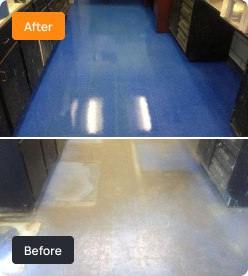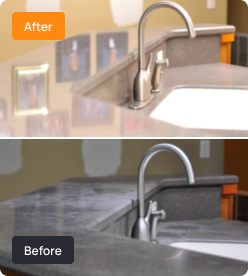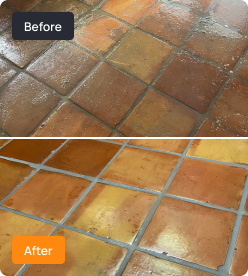Are You Using Vinegar For Your Marble Cleaning or Other Floors? You Need to Stop that NOW!
Using vinegar for marble cleaning might seem harmless, but it can cause lasting damage to your floors, grout, and stone surfaces. Discover how to clean marble floors the right way, why vinegar isn’t safe for marble, and which natural marble cleaning solutions truly work, without risking dullness or etching. But what’s the real story? […]
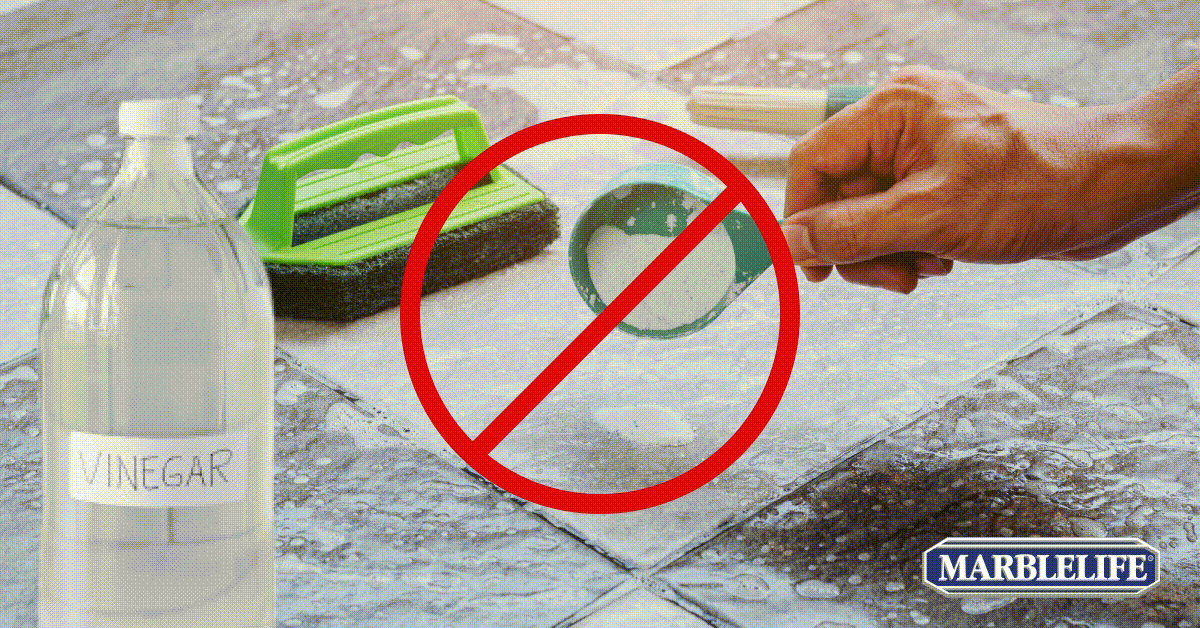

Using vinegar for marble cleaning might seem harmless, but it can cause lasting damage to your floors, grout, and stone surfaces. Discover how to clean marble floors the right way, why vinegar isn’t safe for marble, and which natural marble cleaning solutions truly work, without risking dullness or etching.
But what’s the real story? Does vinegar genuinely work on marble floors or on any floor type, for that matter? Or is it now a leading cause of self-inflicted damage to acid-sensitive substrates such as marble, travertine, and limestone, and could it be linked to stained grout and stone due to its negative impact on surface seals?
Let’s delve into it.
Unmasking Vinegar: The Go-To DIY Cleaning Agent
Vinegar is often praised as a go-to DIY cleaner. It’s natural, affordable, and commonly used for everything from disinfecting kitchens to removing hard water stains. Many homeowners even rely on it as a marble cleaner or a general-purpose floor cleaner.
However, vinegar is not safe for marble. It is one of the most common causes of long-term damage to natural stone surfaces.
Before you reach for the bottle, it is important to understand how vinegar affects marble cleaning and what safer alternatives you can use.
Effects on Different Types of Surfaces
Marble Cleaning, Travertine Cleaning, Limestone, and Concrete:
The acid in vinegar reacts with calcium carbonate in marble, travertine, limestone, and concrete, causing etching and dullness. Etching can appear as rings, spots, or faded patches, especially after regular mopping with vinegar.
You might think it’s cleaner, but the natural shine is being destroyed. If you’re truly aiming for long-term cleanliness and preservation, how to clean marble floors begins with avoiding vinegar.
The images below depict a red-brown floor restored after being repeatedly cleaned with vinegar.
Note the white faded appearance in the ‘BEFORE’ image. If the ‘AFTER’ floor is cleaned with vinegar, it will incur damage once again.
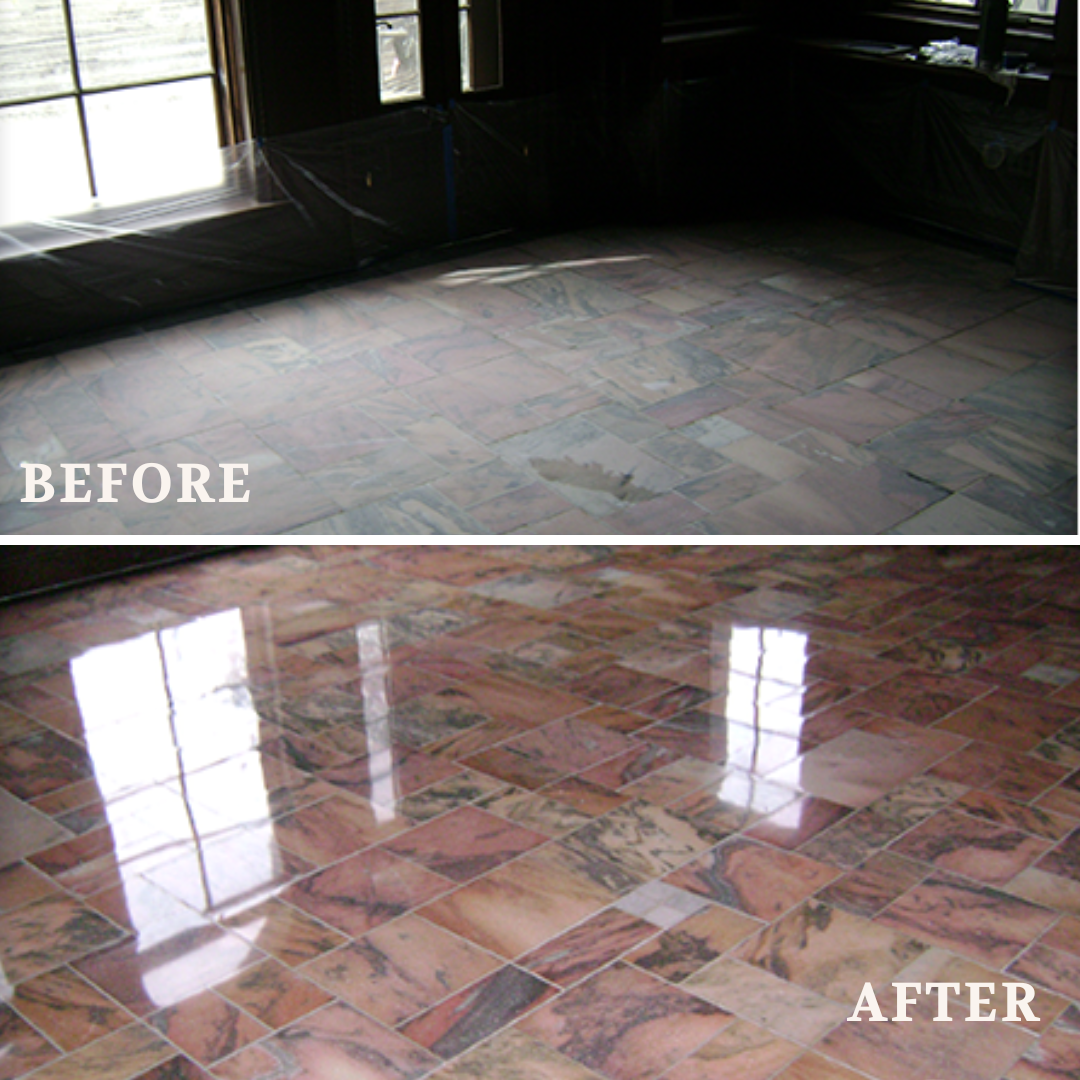
Restored Floor After Being Repeatedly Cleaned with Vinegar
The calcium carbonate composition of marble floor and travertine reacts with the acid in vinegar, leading to chemical damage associated with the marble dissolving at the point of contact.
Repeated vinegar use on marble floors chemically dissolves the surface layer. Over time, the natural luster disappears. If damage occurs, professional restoration is often the only solution.
Terrazzo
Terrazzo is generally constructed with marble chips suspended in either a concrete or epoxy base.
Chips
The marble chips/chunks are susceptible to etching, as noted above with marble. The floor will appear to exhibit a faded color.
Terrazzo can also be made with non-marble chips where granite or glass may be used to avoid this issue.
Base
A concrete base can be etched, whereas an epoxy base does NOT have this issue.
Tile & Grout:
While vinegar can be effective for cleaning ceramic or porcelain tiles, it is not suitable for sanded or non-sanded grout. In this case, it is not the grout material that is generally the issue but rather the dyes used to color the grout and/or the penetrating sealer used to seal the grout.
Dyes – Most grouts are cementitious in nature, meaning they are naturally gray in color and then dyed to the color we see and select. Vinegar can leach the dye out of the grout, lightening it, but in reality, it’s reversing the color towards its undyed natural light gray color.
As such, the observation that stained grout has been lightened is often mistaken as cleaning but in reality, it is a loss of color dye. You don’t often hear people report vinegar restored a clean surface; instead, you hear people say it “made it better.”
This refers to their mistaken belief that lighter equals less dirty.
Seals – Most grouts are originally sealed with a penetrating silicone-based sealer. These sealers perform excellently at neutral pH, but break down, reverting back to their original raw materials at low pH values.
Consequently, cleaning with vinegar effectively washes away the grout’s protective seal, transforming it into a concrete sponge which WILL absorb dirty mop water during the cleaning process and become stained.
As such, vinegar cleaning of grout WILL contribute to grout staining. (The exception is epoxy grout, which does not require penetrating sealer sealing being naturally non-porous; epoxy grout is an exception)
How confident are we about the damaging effect of vinegar and other acids on grout seals? We utilize this effect to remove any residual sealer when MARBLELIFE is installing a new infusing sealer with a non-acid-sensitive chemistry to overcome this very issue.
So we use this performance intentionally to remove seals, allowing us to install a MARBLELIFE COLORSEAL that is NOT acid sensitive and offers better protection for the grout once we have cleaned and restored it.
Granite:
Granite is NOT susceptible to direct acid attack, but the sealers used to protect the granite against staining are just as vulnerable as grout sealers as they utilize the same base chemistry.
If you have been told that granite does not need to be sealed because it has been resinated, take heed. This presumes that the resination process fills ALL pores throughout the stone.
That is not the intent, and it is not marketed as a sealer. Resination is performed to enhance the stone’s transportability by adding flexibility. In simpler terms, it reduces brittleness so the stone won’t crack during overseas shipping.
However, open pores still remain, especially those that start at the surface but do not extend all the way through the slab.These surface pores are still susceptible to staining.
Slate:
Slate surfaces are known for their natural beauty and texture. Vinegar’s acidity will remove the grout sealer protection, resulting in grout staining over time. It can also damage or remove the oils used to enrich the slate’s color or to provide a “wet” look. If one has slate, reach out to MARBLELIFE.
>The restorative services and effects available for slate today are light years ahead of what was available just ten years ago.
Shower:
>Vinegar is often used to remove hard water stains, which is precipitated calcium carbonate, the same material marble, limestone, and travertine are made of.
Therefore, any acidic cleaners targeting hard water stains will damage these surfaces directly and contribute to grout staining. MARBLELIFE has processes to remove hard water stains tailored to the surface on which it is found to avoid such damage.
It is crucial to consider the specific characteristics and sensitivities of each surface before using vinegar as a cleaner. While it may be effective for some surfaces, it can lead to undesirable consequences for others.
>For optimal results and to protect the beauty and longevity of your surfaces, it is advisable to seek professional care and use products specifically designed for each surface type.
If in doubt, CALL MARBLELIFE. MARBLELIFE has offices throughout North America and offers a FREE CONSULTATION. It is far faster and cheaper to make a single call than to experiment blindly, as each experiment may be creating more damage, and subsequently more work and cost to repair.
MARBLELIFE’s professional CARE network helps clients maintain their surfaces quickly, easily, and affordably
The MARBLELIFE Advantage: Bringing Surfaces Back-to-Life
Over the years, MARBLELIFE has become a leader in marble cleaning and stone restoration throughout North America. From homes to large commercial properties, their trained technicians and proprietary processes deliver safe and stunning results.
They use stone-safe products that are scientifically developed products that clean thoroughly without harming the stone. If you’ve already experienced damage from vinegar, MARBLELIFE can help restore and protect your surface.
Why Trust MARBLELIFE: The Science Behind Beautiful Surfaces
MARBLELIFE’s approach is built on science and experience. They understand the chemistry of each material and tailor cleaning solutions to each surface type.
Unlike vinegar, which is a general-purpose acid, their products are engineered to deliver safe and lasting results. It’s the difference between damaging your floors and preserving them for years.
>By taking into account the chemical properties of each surface, the company is able to tailor its products and services to deliver optimal results.
MARBLELIFE Solutions: Excellence in Every Space
>Whether you’re a homeowner with marble countertops in your kitchen or a commercial building manager with travertine floors in your lobby, MARBLELIFE has a solution for you.
>With more than 50 locations throughout North America, you can trust MARBLELIFE to provide top-quality care for all of your residential and commercial spaces.
MARBLELIFE’s services are more than just surface-level. We dive deep to resolve the root causes of your surface issues, delivering results that last. By identifying and addressing underlying problems, MARBLELIFE ensures that your surfaces remain in pristine condition, reducing the need for frequent repairs or replacements.
So, when it comes to preserving your surfaces, you might want to think twice before reaching for that vinegar bottle.
Summary: Think Before You Clean
>While vinegar can be an effective cleaner for certain situations, it’s important to consider the potential damage it can cause to delicate surfaces.
It may not be the best option for your marble, travertine, limestone, granite, or grout surfaces. It’s important to understand what you’re cleaning with and what potential damage it could cause.
If you’re unsure, consult a professional. Investing in the right products and services can save you from costly restorations down the line. If you’ve been using vinegar to clean your surfaces, it may be time to transition to an appropriate cleaner for your surface type.
So why wait? Contact MARBLELIFE now for a consultation or to explore their range of specialized products. Remember, keeping your home or business space looking its best doesn’t have to be a struggle.
With MARBLELIFE’s expert care, maintaining the shine and grandeur of your surfaces has never been easier.


